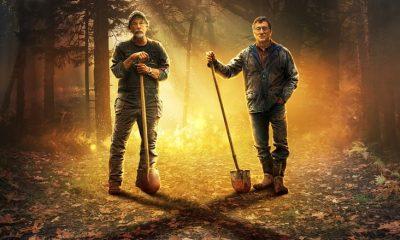News
The Tattooist of Auschwitz: Bringing Lali Sokolov’s Story to Life
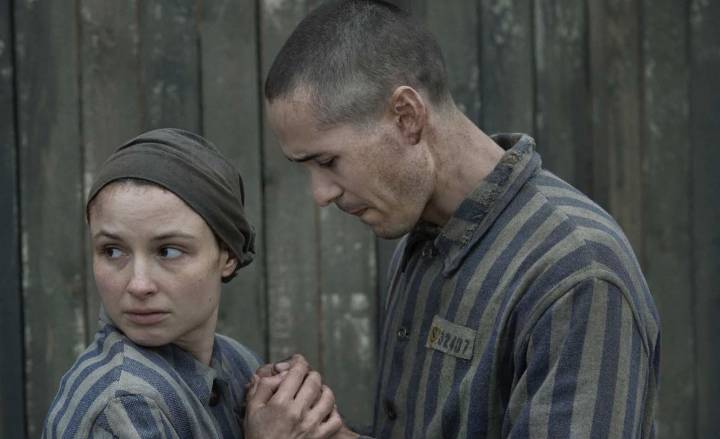
The Tattooist of Auschwitz is an upcoming Sky TV series premiering 2 May, that brings to life the remarkable and inspiring story of Holocaust survivor and Slovakian Jew, Lali Sokolov.
Based on the bestselling book by Heather Morris, the series tells the story of Lali’s experiences as a prisoner in the Auschwitz concentration camp during World War II and his extraordinary love story with fellow prisoner, Gita. The show also shines a light on Lali’s later years, when he opened up about his traumatic past to Morris, an aspiring writer who would go on to share his story with the world. With a talented international cast and a meticulous attention to detail, the series promises to offer a thoughtful, compelling, and respectful portrayal of survival, love, and the enduring power of hope, even in the face of immense darkness.
“I experienced many emotions,” said Gary Sokolov, son of Lali and Gita, when asked about his initial reaction to the news that his parents’ story would be adapted for television. “I always believed in my heart that this was a story that needed to be told…My mum and dad’s story has everything: romance, love, survival, and hope, all set against a backdrop of some of the worst conditions that have existed.” The Sokolov family’s story is indeed a testament to the resilience of the human spirit and the power of love to persevere even in the darkest of times.
The series is executive produced by Claire Mundell, whose company, Synchronicity Films, optioned the rights to the book in 2018. Mundell was drawn to the emotional and epic nature of the story, particularly the idea of a love story unfolding in one of the most notorious concentration camps in history. “As a producer, I’m drawn to stories based on real life,” she said. “It was clearly a very moving, emotional, and epic story. And the idea of a love story set in Auschwitz was incredible.” Mundell recognized the potential for Lali’s story to resonate with audiences worldwide and felt a sense of responsibility in bringing it to the screen.
To adapt the story into a long-form scripted series, Mundell collaborated with Australian writer Jacquelin Perske, who played a pivotal role in shaping the narrative. Perske spent time with Morris in Melbourne, Australia, to understand the process of writing the book and the unique bond that formed between Morris and Sokolov. “Heather, who had never written anything before, spent a lot of time talking to Lali,” Perske recalled. “They became incredibly good friends with a very special bond.”
The series narrative structure is carefully crafted, switching between young Lali’s experiences in Auschwitz and older Lali’s conversations with Morris. This approach allowed the creative team to explore the themes of post-trauma and the complex nature of memory. “Through Lali’s developing relationship with Heather Morris, the series shows the purpose that telling his story served—the unburdening of years of repressed trauma and his recognition and banishment of the ghosts of his past,” Mundell explained. It provides a unique perspective on the long-lasting impact of trauma and the healing power of sharing one’s story.
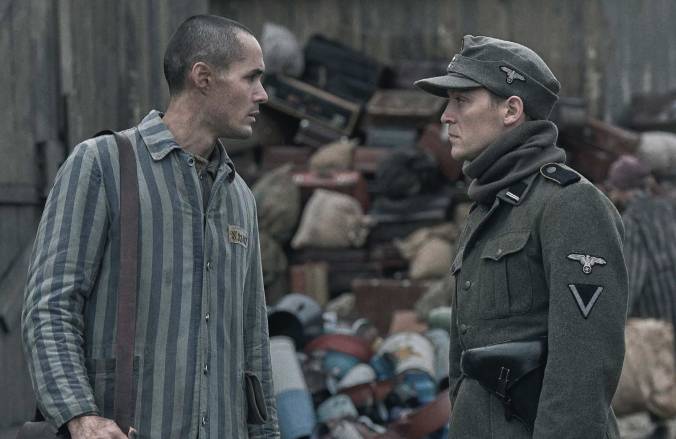
The production team took their responsibility for historical accuracy seriously and consulted extensively with Holocaust experts and researchers. They visited Auschwitz several times and enlisted the guidance of Naomi Gryn, who served as the Historical and Jewish Cultural Consultant. Gryn, herself the child of a Holocaust survivor, brought a wealth of knowledge and expertise to the project. “Naomi was the conduit between production and Holocaust research,” Mundell said. “She understood the objectives of each given her experience as a filmmaker and researcher.” Gryn’s contributions ensured that the series portrayed the realities of life in Auschwitz with sensitivity and accuracy.
At the helm of all six episodes of the series is director Tali Shalom-Ezer, a talented filmmaker known for her exploration of trauma in her work. Shalom-Ezer felt a deep connection to the story and approached it with reverence and respect. “I tried to get as close as possible to [Lali’s] emotions and to express them on screen,” she said. One of the key themes that the series examines is the guilt that Lali felt as a tattooist, a role that afforded him certain privileges within the camp. “The feeling of guilt wasn’t as prominent in the book as in the series,” Shalom-Ezer explained. “We try to highlight that [Lali] felt guilty about being, in some way, part of the Nazi system.”
Shalom-Ezer also emphasized the importance of including the character of Heather Morris in the series: “Lali had never told anyone some of the stories he told Heather. In talking to her, Lali was going through a process of healing.” Morris’s role in Lali’s life was significant, and her presence in the series provides a framework for understanding Lali’s journey of healing and coming to terms with his past.
The casting of the series was a crucial aspect, and Mundell sought emotionally intelligent actors who could portray the young Lali and Gita with authenticity and depth. Jonah Hauer-King, a talented actor with a personal connection to the story, was chosen to play young Lali. “I knew it was going to be very difficult not to bring a lot of my own baggage and preconceptions…It’s an unavoidably sensitive and painful period of history,” Hauer-King shared. He also praised Shalom-Ezer’s collaborative approach and her passion for the project, which helped guide the cast and crew through the challenging subject matter.
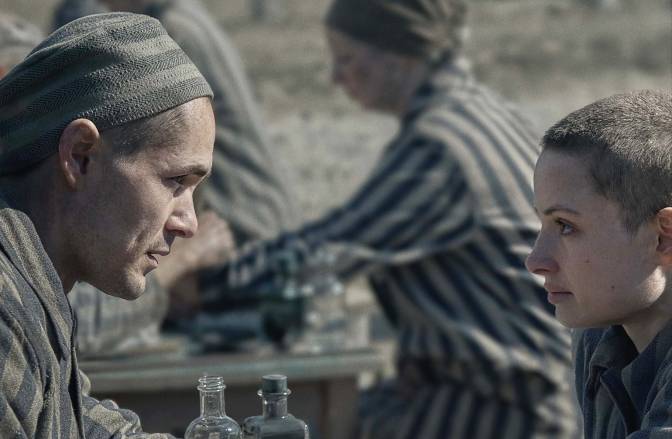
Anna Próchniak, a Polish-born actress, was selected to play the role of Gita. “It was the hardest and the most challenging role I’ve ever done,” Próchniak said. She immersed herself in the character, undergoing a physical transformation and go deep into Gita’s inner life. “I meditated every day, I went on long walks, I did yoga…I tried to stay as mindful as possible,” she shared. Próchniak also emphasized the importance of continuing to tell stories about the Holocaust: “The world is so full of evil and hatred, and it’s getting worse…We must prioritize educating the next generations.”
Screen icon Harvey Keitel portrays the older Lali, and his performance left a profound impression on Sokolov: “There were moments when I couldn’t tell the difference between my father and Harvey Keitel…He portrayed dad beyond anything I could ever have expected.” Keitel’s embodiment of Lali’s later years brought the character’s emotions and experiences to life, evoking a strong response from those who knew Lali.
Melanie Lynskey plays Heather Morris in the series. Lynskey shared her thoughts on the importance of the series and its ability to shed light on a dark chapter in history: “I don’t think there can be enough stories…It’s a reminder of how horrific the Holocaust was, but also an incredible story of survival and a beautiful love story.”
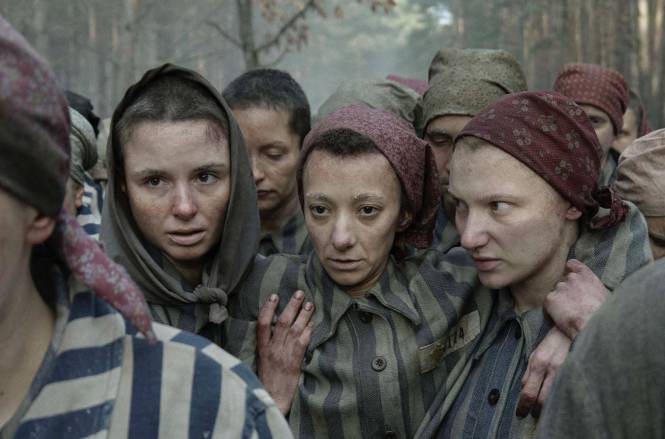
The costume and production design is meticulous.
The look of The Tattooist of Auschwitz is carefully crafted to capture the harsh realities of life in a concentration camp. Hair and makeup designer Frances Hounsom studied first-hand accounts of Auschwitz survivors, creating visual references that reflected the sadness and dehumanization of the prisoners. Hounsom worked closely with production designer Stevie Herbert to ensure consistency in the visual style of the series. Every detail, from the prisoners’ shaved heads to their loose-fitting uniforms, was meticulously researched and designed to reflect the conditions of the camp.
The Tattooist of Auschwitz also features a powerful and evocative score composed by the legendary Hans Zimmer and the rising talent, Kara Talve. Zimmer, who has a personal connection to the story through his mother’s experience as a refugee fleeing the Nazis, spoke about the challenge of approaching the subject matter with dignity: “It’s a love story set in a nightmare…I had to think how I could show respect [and] find a new voice.” Zimmer’s collaboration with Talve resulted in a score that captures the complex emotions of the series.
Talve, whose grandmother survived the Holocaust by hiding with her piano teacher, brought a unique perspective to the music. “The main theme is love, but also hope and survival,” Talve said. “It’s important to keep telling these stories. I also hope [viewers] feel that love and humanity under the darkest possible conditions can thrive.”
With a thoughtful and sensitive approach to its subject matter, The Tattooist of Auschwitz aims to honor the memories of those who lived through the horrors of Auschwitz. It shines a light on the enduring power of love and hope, even in the darkest of times, and serves as a reminder that even in the midst of immense suffering, humanity and resilience can prevail.
The series will be available from 2 May on Sky Atlantic and streaming service NOW in the UK and Ireland, Italy, Germany, Austria, and Switzerland, Peacock in the US and Stan in Australia.
Images courtesy of Sky.
-

 News3 days ago
News3 days agoOur Welsh Chapel Dream Series Premiere, 5 May 2024, Channel 4
-

 News2 days ago
News2 days agoAmerican Idol: Adele Night, May 5, 2024, ABC
-

 News21 hours ago
News21 hours agoDeal or No Deal Island, NBC, May 6, 2024, “Are You Tenacious?”
-

 News3 days ago
News3 days agoThe Henry Ford’s Innovation Nation, May 4, 2024, CBS, “Solar Campers”
























